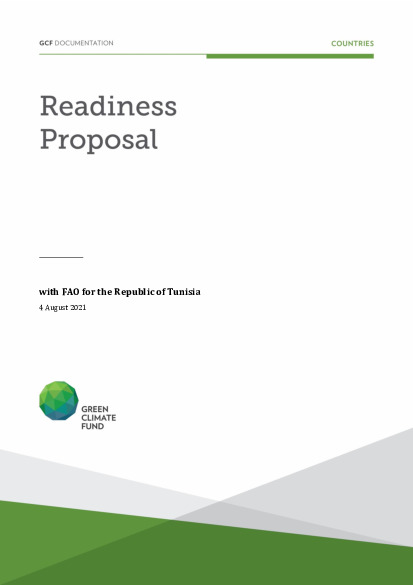Food Security and Adaptation Priorities in the Agricultural Sector in Tunisia

Food Security and Adaptation Priorities in the Agricultural Sector in Tunisia
- The Nationally Determined Contribution (NDC) for Tunisia indicates that its economy, the population and ecosystems are highly vulnerable to climate change (CC). The country is expected to see shrinking of agricultural land areas due to increasing water scarcity and declining yields of about 5 to 10% by as early as 2030, notably for cereals, arboriculture and livestock. Tunisia’s Third National Communication (2019) indicated likely increases in droughts and floods, which will have significant negative impacts on food security and malnutrition.
- In 2012, Tunisia developed its National Strategy on Climate Change (SNCC) aimed at planning, integrating and aligning approaches to address CC challenges. Tunisia’s NDC (2015) identified six key sectors as the most vulnerable to the adverse effects of CC. It also identifies the intangible investments of institutional support, capacity building and research and development as some of the areas of adaptation in need of the most financial support. In addition, the first readiness report submitted by Tunisia indicated as a priority the capacity-building and mobilization of the private sector to encourage climate smart investments. Moreover, the second readiness aimed at developing new climate related projects, enhance communication at national level, accreditation of one national entity for GCF financing, and increase private sector mobilization.
- The proposed NAP readiness project aims to address these gaps and opportunities identified for enhancing food security and agricultural resilience to CC. In doing so, it will contribute to the overall objective of the National Strategy on Climate Change to align and integrate CC approaches towards achieving sustainable food security and agriculture in Tunisia and enhancing the resilience of the vulnerable population and ecosystems to CC.
- The project aims to generate adaptation options in the agriculture sector (water, land, crops, livestock, fisheries, aquaculture and forestry) and investment priorities, and strengthen the enabling framework for adaptation planning, including clarifying the roles and contributions of stakeholders such as the private sector. Activities and deliverables will be integrated with ongoing and future policies, budgetary and investment plans, and agriculture and agribusiness strategies.
- In other words, the project’s objective is to enhance the resilience of the agriculture sector (water, land, crops, livestock, fisheries, aquaculture and forestry), rural community and food security by creating an enabling environment and adopting well-informed and integrated programs for CC adaptation. For this, knowledge on key adaptation and resilience options at all level (institutional, social, investment and environment) will be generated and anchored into ongoing national planning and future agriculture strategies.
To this end, the project aims to achieve the following three outcomes:- Climate Change Adaptation (CCA) knowledge base strengthened for improved decision-making
- Resilience of Agriculture sector and food security enhanced by climate smart investments through Public Private Partnerships (PPPs);
- Adaptation of the most vulnerable rural communities strengthened through safety nets and digital innovation
- The specific objectives are (i) to support the Government of Tunisia’s efforts to enhance the resilience of the agriculture and agri-business sectors, (ii) to sustain food security over time, and (iii) to contribute to alleviating poverty through agricultural interventions, safety nets and innovation. The project will achieve these results by aligning and integrating efforts to increase the efficacy of adaptation actions through public and PPP contributions as well as through stakeholders’ engagement in national adaptation planning. This includes helping to identify, prioritize, and cost CCA actions in agriculture and food security. It will also help develop new and more effective decision-making processes and tools to deal with CC for improved agricultural resilience and food security in Tunisia.
-
While this proposed project submitted through FAO will emphasize adaptation actions and means to achieve food security over the long term while sustaining the use of natural resources and ecosystems, the more comprehensive aspects of planning for national adaptation to CC in Tunisia will be addressed through the UNDP-led NAP Readiness Project “Advancing risk-informed development and land-use planning in Tunisia” being submitted in parallel to this proposal.
-
UNDP and FAO have worked closely in preparing the proposals and have further sought to clarify the articulation between the two proposals. Additional information regarding the coordination of the two proposals is included in the “Synergy matrix” (Annex 2) and the Logical framework section. In the spirit of UN reforms, FAO and UNDP will establish a consultation committee that will ensure complementarity and efficiency from planning to implementation and reporting.